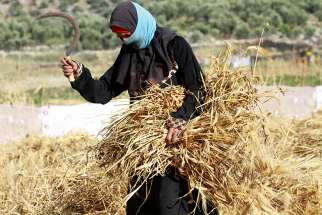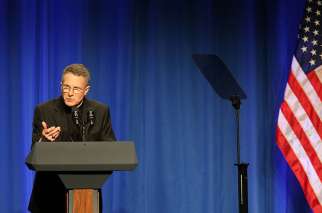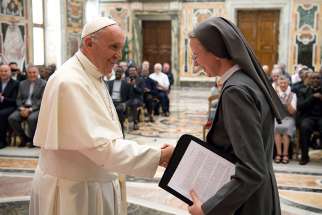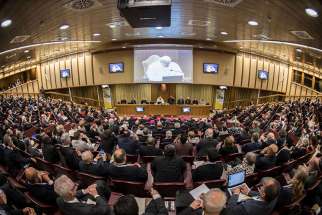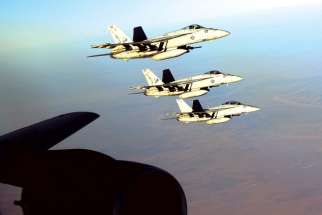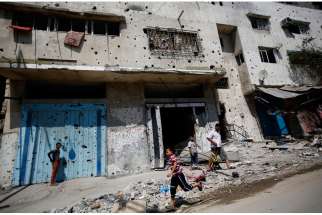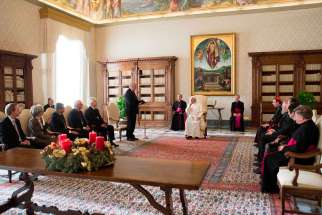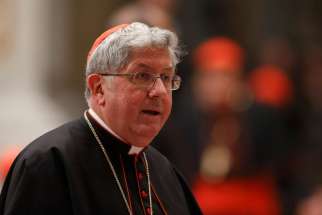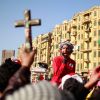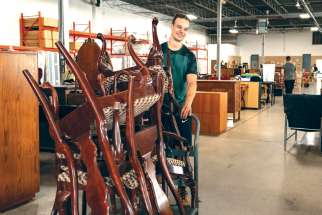WASHINGTON – Archbishop Timothy P. Broglio of the U.S. Archdiocese for the Military Services offered support for President Donald Trump's reinstatement of a ban on transgender people serving in any branch of the military.
VATICAN CITY – Missionaries are entrusted with bringing hope to poor Christian communities while building bridges with Muslims and protecting human rights, Pope Francis told a group of men and women missionaries.
Development must focus on dignity, officials say on 'Populorum Progressio' anniversary.
VATICAN CITY – The Catholic Church's commitment to promoting justice, defending human dignity, building peace and promoting development is a response to a Christian vision of the world and its purpose, which ultimately is to reach happiness with God, Vatican officials said at a conference.
VATICAN CITY – In an unprecedented event, Fortune 500 CEOs, members of the Time 100 and non-profit, academic, religious and labor leaders from throughout the world met in Rome to address the need for a global economic system that both encourages growth and aids the poor.
Syria mission a humanitarian necessity: Chaldean eparch
OTTAWA - The Chaldean Catholic Eparch of Canada says Canadian military intervention against the Islamic State is a humanitarian necessity to protect defenceless people in Iraq and Syria.
'Wall of ignorance' fuels Holy Land fears
OTTAWA - A Canadian bishop who travelled to Gaza with the annual Holy Land Co-ordination visit to the Middle East Jan. 11-12 says fear is the biggest obstacle to mutual recognition of human dignity in the region.
Christians can't ignore differences on life issues, Pope says
VATICAN CITY - Christianity has something to say about human dignity, and "it would be a shame" if differing positions on the sanctity of all human life or on marriage were to increase the divisions among Christian churches and communities, Pope Francis said.
OTTAWA - In a time of severe crisis around the world, Parliamentarians must show integrity and humility in public life, said Cardinal Thomas Collins.
Religion’s role in Arab Spring is promoting dignity, official says
VATICAN CITY - Religious communities can assist the North African and Middle Eastern pro-democracy movements by upholding human dignity and not trying to claim power for one religion or one movement within a religion, a senior Vatican official said.
Comboni Father Miguel Angel Ayuso Guixot, secretary of the Pontifical Council for Interreligious Dialogue, represented the Vatican at a conference in Istanbul Sept. 7-8 on “The Arab Awakening and Peace in the New Middle East: Muslim and Christian Perspectives.” He told participants at the conference that democracy presumes respect for human rights, including the right to freedom of religion and worship.
“In the growing efforts to enable democracy to take hold in the fabric of society in the Arab world, the hope is that it will lead to greater consideration of these basic rights,” Ayuso said.
A hopeful sign, he said, was the publication in January of a “bill of rights of basic liberties” by Muslim scholars at Al-Azhar University in Cairo. The document encouraged recognition of the freedoms of worship, opinion, scientific research and art and creative expression in new constitutions throughout the Arab world.
The 2011 Arab Spring movements led to democratic elections in Morocco, Tunisia and Egypt where Islam-inspired political parties won the most votes. The risk with democracy, Ayuso said, is that it “potentially could be used to legitimate extremist and fundamentalist ideologies,” which would make life difficult not only for the Christian minorities, but also for moderate Muslims.
The role of religion, he said, is to nourish an atmosphere of respect for all men and women created by God and endowed with equal dignity, rights and responsibilities.
Ayuso also spoke about the ongoing violence in Syria in his interview with Vatican Radio and at the conference. The Vatican’s diplomatic efforts in that case are focused on achieving a ceasefire, promoting a negotiated settlement, preserving Syria’s multiethnic and multireligious character and getting the Syrian government to recognize the international community’s legitimate interest in the conflict as a potential source of instability to the entire region, he told Vatican Radio.
He told the conference that Syrian Christians want to live in peace and harmony with their fellow citizens, but they are “naturally fearful that the growing violence, destruction and displacement, the continuing loss of life, endangers not just Christians, but all Syrians, regardless of their ethnicity or religion.”
“The specter of what happened to Christians in Iraq” once Saddam Hussein’s regime fell increases Syrian Christians’ fears, he said.


